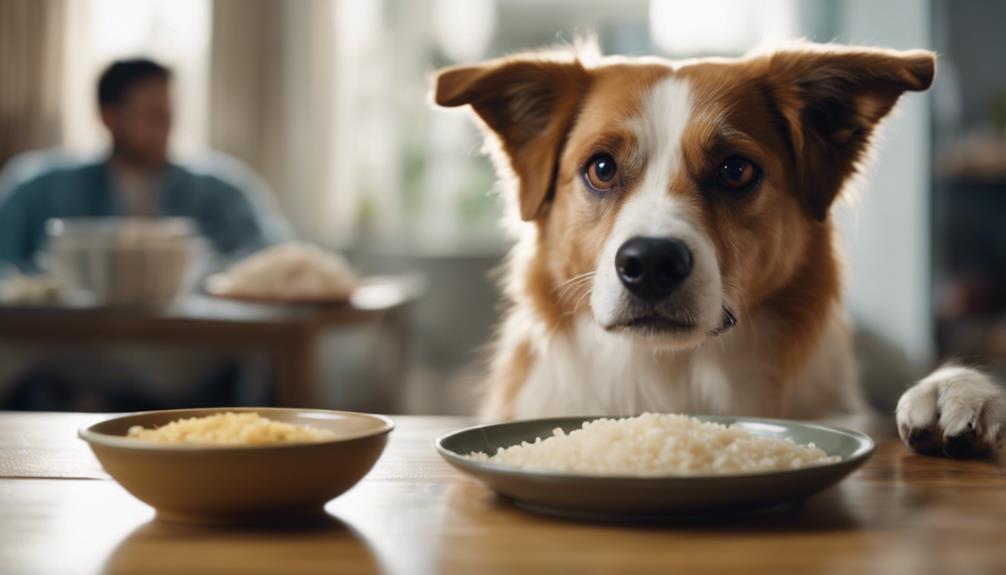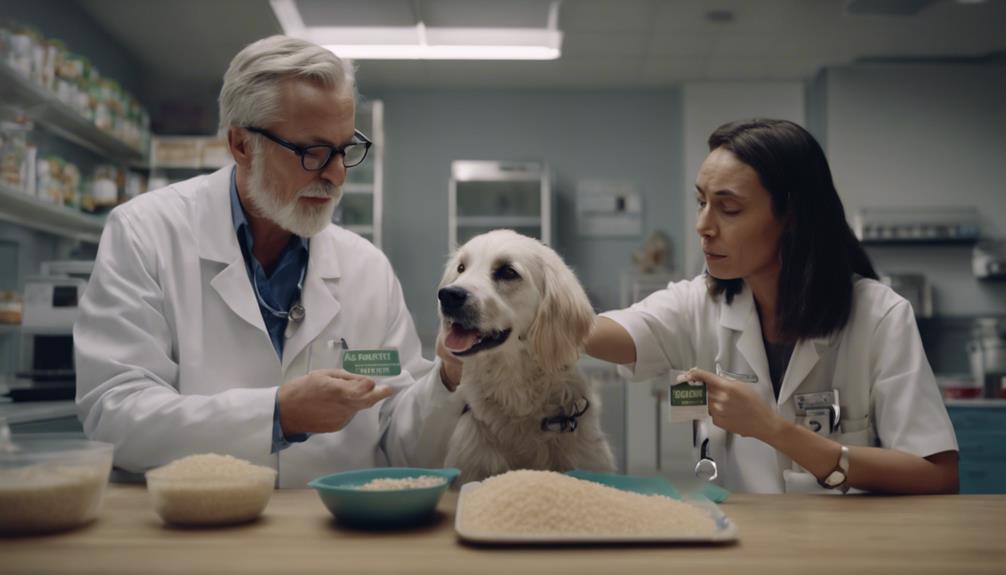Exploring the intricacies of canine nutrition, the question of whether dogs can consume rice has been a topic of contemplation among pet owners. As a fundamental component of many diets, rice's suitability for dogs raises intriguing considerations.
To shed light on this matter, a Pet Nutrition Specialist offers a comprehensive analysis of the implications of incorporating rice into dogs' meals. Unveiling the potential benefits, possible drawbacks, and optimal practices, this expert insight provides invaluable guidance for pet owners seeking to enhance their pets' well-being through diet.
Key Takeaways
- Rice is a beneficial source of carbohydrates for dogs, aiding digestion and energy levels.
- Moderation is essential to prevent dietary imbalances and potential health risks.
- Consult a vet for guidance on incorporating rice into a dog's diet, considering individual health needs.
- Use plain, cooked rice without additives, in small portions, and transition back to regular meals gradually.
Nutritional Benefits of Rice for Dogs
Rice serves as a valuable source of easily digestible carbohydrates that offer nutritional benefits for dogs. Rich in energy, rice aids in digestion, making it suitable for dogs with sensitive stomachs or during recovery from illness.
Brown rice, in particular, provides more nutrients compared to white rice. Its moderate fiber content can assist in managing digestive issues in dogs. However, moderation is key to prevent an imbalanced diet, as overfeeding can lead to obesity.
When included as part of a balanced diet, rice can be a beneficial addition to a dog's meal plan, providing necessary carbohydrates for energy and digestive support.
Health Implications of Feeding Rice
When considering the impact of incorporating rice into a dog's diet, it is essential to understand the potential health implications associated with this dietary choice. While rice can provide easily digestible carbohydrates and aid in managing digestive issues, there are risks to be aware of.
Overfeeding rice can lead to obesity, and dogs with diabetes should consume it cautiously. It is crucial not to make rice the sole food in a dog's diet, as it may lack essential nutrients. Additionally, some dogs may be allergic to rice, and added seasonings can be harmful.
Moderation, balanced nutrition, and consultation with a veterinarian are key in ensuring that rice is a beneficial addition to a dog's diet.
Feeding Guidelines for Dogs and Rice

To ensure optimal nutrition and digestive health for dogs, it is essential to establish appropriate feeding guidelines when incorporating rice into their diet.
- Balance is Key: Maintain a balance of protein, carbohydrates, and fat in the dog's diet, with carbohydrates like rice ideally making up 30-50% of the daily caloric intake.
- Gradual Introduction: Start with small portions of plain, cooked rice without any additives, and gradually increase based on the dog's response.
- Transition Smoothly: Transition back to the dog's regular meals within 2-3 days to ensure a smooth adjustment period.
Types of Rice Suitable for Canines
Among the various options available, certain types of rice stand out as particularly suitable for incorporation into a canine's diet. Brown rice, rich in fiber and nutrients, is a wholesome choice, although it may be slightly harder to digest.
On the other hand, white rice, due to its refinement, is easier on a dog's digestive system. Long-grain rice varieties like jasmine and basmati are safe options for dogs, providing a good source of carbohydrates.
Wild rice, similar to brown rice in nutrient content, can also be fed to dogs. Rice cakes can be given as occasional treats, not exceeding 10% of a dog's daily caloric intake, offering a different texture and flavor for dogs to enjoy.
Using Rice for Digestive Health

Utilizing rice as a dietary aid can be beneficial for improving digestive health in dogs. When considering its role in aiding digestion, rice can be particularly advantageous in the following ways:
- Easy Digestibility: Rice is gentle on the stomach and can help soothe digestive upset in dogs.
- Binding Properties: The mild nature of rice can assist in firming up loose stools and regulating bowel movements.
- Nutritional Support: Rice provides essential energy without putting excessive strain on the digestive system, making it a valuable component in bland diets for dogs with gastrointestinal sensitivities.
Incorporating Rice in Dog's Diet
When considering the dietary incorporation of rice for dogs, its gentle nature and potential benefits for digestive health make it a valuable addition to their meals. Rice, especially brown rice, provides easily digestible carbohydrates and can help manage digestive issues. Moderation is crucial to prevent dietary imbalances. To better understand the types of rice suitable for dogs, refer to the table below:
| Type of Rice | Description | Suitability for Dogs |
|---|---|---|
| Brown rice | More fiber and nutrients, harder to digest | Yes |
| White rice | Easier to digest due to refinement | Yes |
| Long-grain rice | Safe options for dogs | Yes |
| Wild rice | Similar to brown rice in nutrient content | Yes |
Potential Risks of Feeding Rice

Feeding rice to dogs can pose potential risks that dog owners should be aware of to ensure their pets' health and well-being. It is essential to consider the following risks associated with feeding rice to dogs:
- Digestive Upset: Some dogs may experience digestive issues like bloating, gas, or diarrhea when introduced to rice, especially if it's not cooked properly or in excessive amounts.
- Weight Gain: Overfeeding rice can lead to obesity in dogs, as it is a calorie-dense food that should be given in moderation.
- Allergic Reactions: Certain dogs may be allergic to rice, leading to symptoms such as itching, skin irritation, or gastrointestinal problems.
Rice Preparation Tips for Dogs
Considering the importance of proper rice preparation for dogs' optimal health and well-being, it is essential to understand the key steps involved in serving this carbohydrate-rich food to your canine companion.
When preparing rice for dogs, opt for plain, cooked rice without any salt, spices, or sauces. These additives can be harmful to your dog's digestive system.
Start by serving small portions of rice initially, gradually increasing based on your dog's response. Mixing the rice with your dog's regular food can be beneficial.
Properly store any leftover rice to maintain its freshness and prevent contamination. By following these preparation tips, you can ensure that your dog enjoys the nutritional benefits of rice without any unnecessary risks.
Consulting Vet Before Feeding Rice

Prior to introducing rice into your dog's diet, it is advisable to seek guidance from a veterinary professional to ensure the optimal health and well-being of your canine companion. When consulting a vet regarding feeding rice to your dog, consider the following:
- Assessment of Dietary Needs:
- Vets can evaluate your dog's specific dietary requirements.
- They can recommend the appropriate type of rice based on your dog's health status.
- Vets can advise on the quantity of rice that aligns with your dog's nutritional needs.
- Identification of Potential Risks:
- Vets can highlight any health risks associated with feeding rice to your dog.
- They can provide insights on allergies or sensitivities your dog may have to rice.
- Vets can suggest alternative dietary options if rice is not suitable for your dog.
- Monitoring and Follow-Up:
- Vets can monitor your dog's response to rice consumption.
- They can provide guidance on adjusting the rice quantity based on your dog's health.
- Follow-up consultations can ensure the diet remains appropriate for your dog's well-being.
Conclusion
In conclusion, rice can be a beneficial addition to a dog's diet, providing essential nutrients and potential digestive health benefits.
However, it is important for pet owners to be mindful of the type of rice they feed their dogs, follow feeding guidelines, and consult with a veterinarian before making any changes to their pet's nutrition plan.
Responsible incorporation of rice in a dog's diet can contribute to their overall health and well-being.




